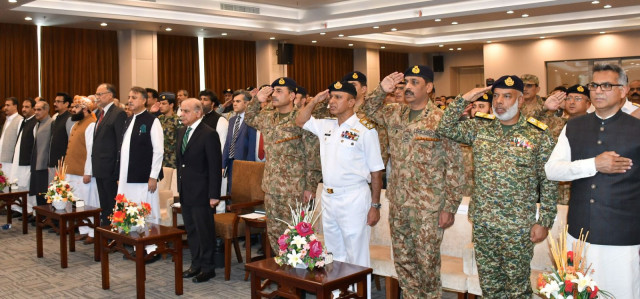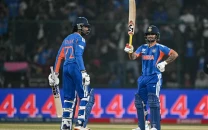75th martyrdom anniversary of Capt Sarwar observed
A smartly turned out contingent of Pakistan Army presented guard of honour, says ISPR

The 75th martyrdom anniversary of Captain Muhammad Sarwar Shaheed, Nishan-e-Haider, was observed on Thursday, the military said in a statement.
According to Inter-Services Public Relations (ISPR), the Director General Rawalpindi Garrison Security Area (RGSA) laid floral wreath at the martyr’s mausoleum in his native town Sanghori in Gujjar Khan.
According to the military’s media wing, a smartly turned out contingent of the Pakistan Army presented a guard of honour.
People from different walks of life, civil and military officials and relatives of the martyrs attended the wreath-laying ceremony, it added.
Captain Muhammad Sarwar, the first recipient of Nishan-e-Haider, who demonstrated indomitable courage and valour in defence of motherland and embraced martyrdom at Tilpatra in Azad Jammu and Kashmir (AJK) in 1948.
Read more: 72nd death anniversary of Captain Sarwar today
Captain Muhammad Sarwar’s martyrdom anniversary serves as a powerful reminder of the extraordinary sacrifices made by the armed forces of Pakistan to defend the motherland.
“Let us remember these heroes who have laid down their lives in defence of our motherland. The nation is proud of its gallant sons,” ISPR had said a day earlier.
Sarwar was born on November 10, 1910 at Singhori village in Gujar Khan Tehsil of Punjab’s Rawalpindi district in British India to Jeevani Bibi.
His father, Raja Muhammad Hayat Khan, was also a havaldar in the British Army. Following in the footsteps of his father, he joined military in 1929 as a sepoy at the age of 19 years.
In 1939, Sarwar was invited to attend the Indian Military Academy in Dehradun from where he passed out on April 21, 1944 as a commissioned officer and became a second lieutenant. He got promoted as a temporary captain on June 30, 1944.
In 1945, the temporary captain took part in battle in Burma against Japanese. He joined in the Punjab Regiment in March 1946 and served it till August. He was promoted as a captain on February 1, 1947.
Read more: 72nd death anniversary of Captain Sarwar today
When a war broke out between the newly formed states of Pakistan and India after illegal annexation of the Himalayan valley of Jammu and Kashmir with India, Sarwar immediately volunteered but he was not allowed by his officers who wanted him to complete his training in military signals.
In 1948, he took over the command of the 2nd Battalion of the Punjab Regiment of the Pakistan Army as its commanding officer, organised with the purpose of retaking Kashmir.
A march towards the Uri region of Kashmir was commenced under Captain Sarwar, and the battalion led an attack on the disorganised Indian Army's troops, forcing them to retreat from the Gilgit-Baltistan to Ladakh in Kashmir on July 26, 1948.
Captain Sarwar's company followed the retreating Indian Army's troops to the Uri region where his unit faced off the strongly fortified enemy position.
His company was only 50 yards away from the fortified enemy position as the Indian Army's soldiers began their mortar shelling at his positions. He had received instructions to lead the attack on the left side of the Indian bunker which was surrounded with barbed wires.
Sarwar decided to cut the wires and took along only six men to perform this arduous task.
Despite massive Indian firing, Captain Sarwar succeeded to cut the barbed wires with a bolt cutter. Due to continuous downpour of shelling, his chest had perforated. He died while clearing the passage for his soldiers The brave captain was 38 years old when he embraced martyrdom.



















COMMENTS
Comments are moderated and generally will be posted if they are on-topic and not abusive.
For more information, please see our Comments FAQ